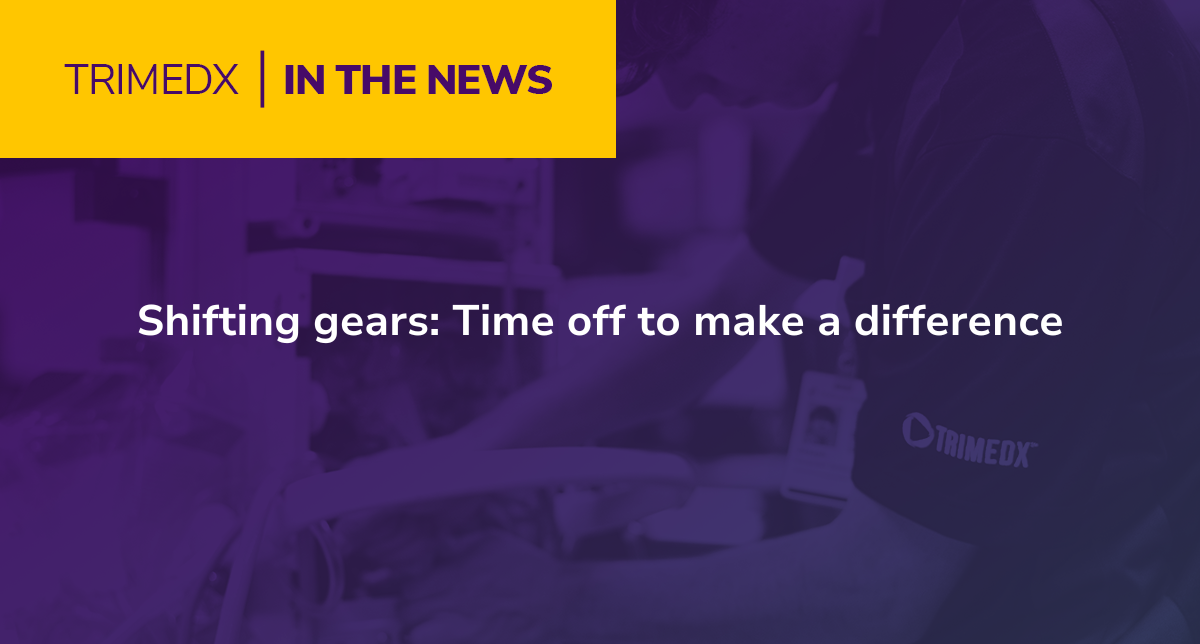TRIMEDX Biomedical Technician Brandon Plank was recently featured in a TechNation Magazine article highlighting how he puts his skill to work through volunteer efforts to make a difference beyond the client he serves. The full article, as it appeared on Jan. 1, 2025, is below.
Many lives have been saved in developing countries because of the availability of modern medical equipment. Often, this equipment would not be obtainable by the hospitals and health clinics that receive it. Several U.S.-based charitable organizations have restored and provided used medical equipment to developing countries for many years.
One of those organizations is SOS International, founded in 1993 by Dr. Norton Waterman. Waterman realized that unused medical supplies were discarded based on protocol. This resulted in six million pounds of medical waste annually. Why not, instead, provide used medical equipment and unused supplies to those in need?
Since that time, the organization has provided medical needs to health care facilities in 108 countries. The organization depends on volunteers to help accomplish this mission. As a provider of recovered medical equipment, there is a need for biomeds who have the skills to repair and maintain that equipment.
“The company I work for partners with SOS International (and many other volunteer programs). When the organization has a bulk of equipment come in, or is in need of something to go out as soon as possible, they reach out and ask for volunteers,” says Brandon Plank, a biomedical technician with TRIMEDX in Louisville, Kentucky.
Plank says he was given the opportunity to volunteer at SOS Louisville.
“I took personal time off and spent three days learning how the organization works. I was very humbled to see all the volunteers come together to receive, sort and ship all of the sterile supplies and equipment received. When I arrived, there was equipment ranging from oxygen concentrators, infusion pumps, ultrasounds, defibrillators and ESUs. They asked us to work on two infant warmers that came in and needed repair, which was a stat request due to the severity of need of infant warmers overseas,” Plank says.
He says that it felt great to volunteer his skills to help support those in need.
The Volunteer Experience
Plank says that SOS International accepts medical equipment, sterile supplies and other disposable items. His experience highlights why biomeds are needed.
“The volunteers work hard to organize and ship the supplies, but when it comes to the equipment, they need assistance. The biomed is expected to perform a full functional checkout and ensure the device has basic leads/hoses. The shop has rooms full of patient leads/hoses/cuffs so it wasn’t difficult to locate missing pieces,” he says.
When Plank volunteered, the organization was in particular need of baby warmers.
“The program really opens your eyes to the number of countries in need of basic medical equipment and sterile supplies. When I was first contacted about the opportunity, I was informed the location had two broken baby warmers and those items were in tremendous demand. They were able to be fixed on site and shipped out the next day,” Plank says.
What skills would a biomed need to be able to do this kind of volunteer work?
“The tech should already have a solid understanding of medical equipment basics such as infusion pumps, electrosurgical generators, ventilators and pediatric/neonatal equipment. Being able to approach any medical device and run a basic check out is a must,” Plank says.
He points out that the industry has changed a lot since the generation of equipment that is often donated and requires a biomed to navigate through older menus. “The equipment that comes in is typically quite old and at end of life by OEM, so even those who are familiar with newer medical equipment would have difficulty working on the dated equipment,” Plank points out.
Plank’s career as a biomed began in 2008 when he graduated from Vincennes University with an A.A.S in biomedical electronics.
“The economy crashed during that time and hiring freezes were across the country. Without a chance for a new technician getting a BMET job before tenured techs, I took a job in sterile processing at an orthopedic hospital. I figured if I can’t get into the field right away, I can at least learn the OR,” he says.
Plank says that it took two years before a BMET opportunity came along.
“The next position was an in-house biomed at a small hospital in Indiana. I worked for a third-party company and that was my assigned site. I stayed there for five years until a field service position opened up in Indianapolis within the same company. I stayed there another three years until I decided I wanted to work for an OEM and see the other side of medical equipment; the manufacturing and engineering,” he says.
He says that he took a position with an OEM for two years until a large hospital group in Indianapolis had a position he really wanted, which is where he is now.
There are very likely two babies thriving in a developing country somewhere today thanks to Plank’s skill set and efforts. This is a worthwhile use of a biomed’s spare time, knowing the contribution makes a big difference.
